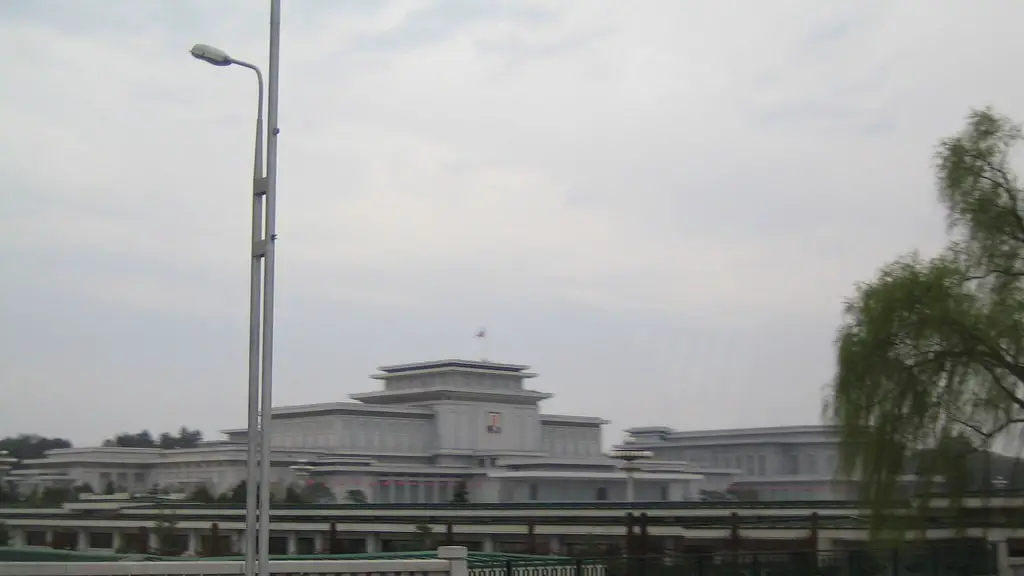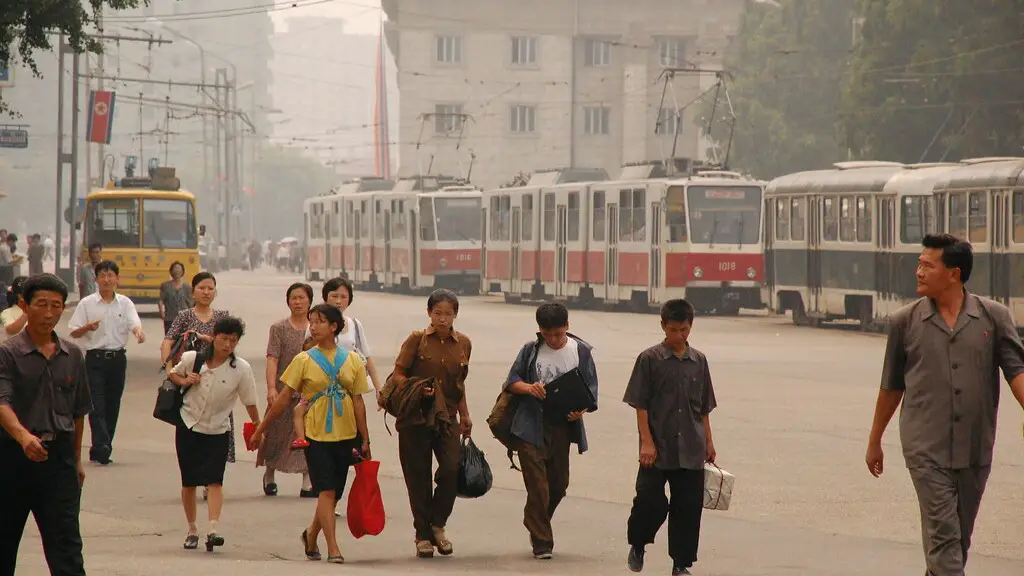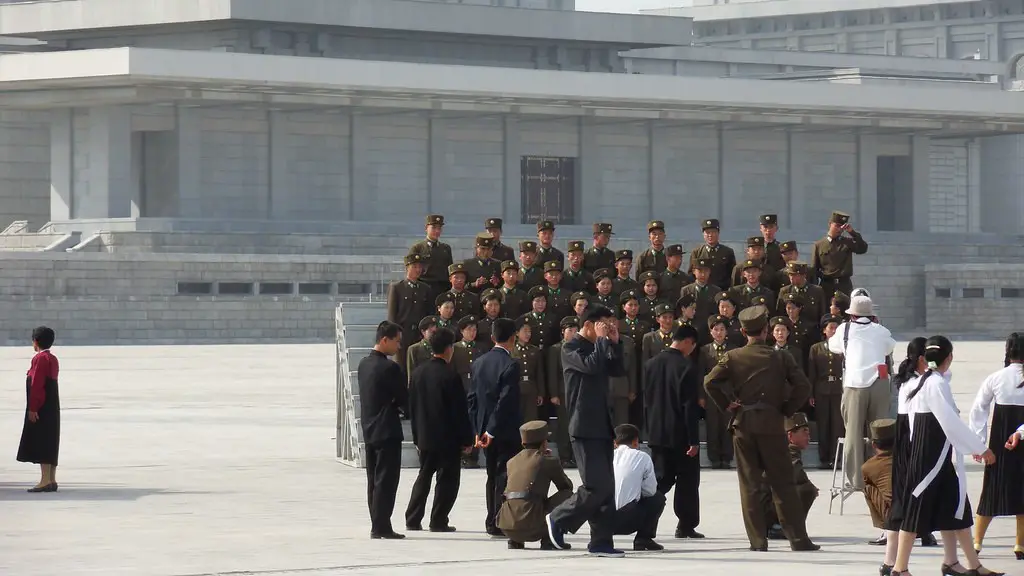Background Information
In addition to being recognized as the most powerful country in the world, the USA is seen by many as the leader of world politics and culture. The US has a significant role in economic and financial decisions made on the global stage. It is this attention and influence that North Korea hates the most. North Korea views the US as a rival and an enemy, claiming its actions are unjust, intrusive and an affront to their independence and sovereignty.
North Korea’s leaders have adopted a number of techniques to show their displeasure with the US, from verbal attacks to military demonstrations. The hostile rhetoric has been accompanied by weapons tests and other displays of military prowess, all railed against the United States and its allies in the region. Some experts point to historical events as the root cause of the hostility between the two nations, including the Korean War, US-backed military dictatorships in South Korea, sanctions placed on North Korea, and the American promise to defend South Korea if it was attacked.
Economic Impact
North Korea’s animosity toward the US has impacted its already weak economy in a number of ways. Sanctions imposed by the US have had a long-term impact on North Korea’s ability to access global markets and trade, limiting the nation’s potential for economic growth. North Korea’s leaders have ratcheted up their rhetoric, calling for an end to these restrictions and forcefully expressing their disapproval of America’s actions.
As the leader of international economic forums, the US has taken a hardline stance when it comes to North Korean involvement in global markets. US officials have blocked trade financing from entering the country, preventing North Korean companies from purchasing goods and services from abroad. This refusal to engage economically has done little to endear the US to North Korean leaders and some experts argue that this economic isolation could push the country further towards a more hostile stance.
Military Matters
North Korea’s leaders have frequently expressed their displeasure with the US, often through military demonstrations and weapons tests. This is usually done to demonstrate the country’s power and capability, while also showing that they’re not afraid to stand up to the US. In 2017, North Korea conducted its most powerful nuclear test to date, a move that was a direct violation of US sanctions.
On top of this, North Korea has also declared that they have the capability to launch a nuclear attack on the US mainland. In the past, North Korean leaders have also threatened to attack US bases in South Korea. These statements are seen as a way to assert they won’t be intimidated by America’s power, while also serving as a reminder that the country has the capabilities to cause significant damage.
Political Influence
Another area in which North Korea hates America is its influence on global politics. As a superpower, the US is seen by many countries in the world as a leader and has the ability to shape decisions and policy on the international stage. North Korea has long opposed American involvement in the region, fearing it could take away the country’s political autonomy.
Even though they are seen as a very isolated nation, North Korean leaders have continued to oppose US efforts to make deals and impose sanctions on the country. North Korea’s leaders have also frequently called out US military interventions in the Middle East, claiming that the superpower is using its influence to impose its own political will on other countries.
Cultural Impact
A final area of contention between the two countries is their cultural influence. The US is seen by many as a cultural innovator through the movies, music and other forms of entertainment it produces. This has been met with resentment in North Korea, as the country’s leaders believe these western influences are a form of cultural imperialism.
To counter this, North Korean leaders have promoted their own cultural narrative of Juche, a state-sponsored ideology which insists on North Korea’s self-reliance and independence. Critics of Juche see it as an attempt to create a unified North Korean identity and limit the influence of the US and its allies in the region.
Political Ideologies
Lastly, North Korea’s rulers have firmly rejected America’s political ideologies and way of life. North Korea’s government has a proud legacy and is entirely different to the American system of democracy, capitalism, and human rights. This difference in ideologies has created a clear divide between the two nations, as North Korea has rejected many of the liberal values that America stands for.
North Korean leaders have railed against the US for being too interventionist and for pushing their liberal agenda on countries in the region. This is seen by North Korea as a way for the US to gain control over countries who don’t subscribe to the same values and beliefs.
Human Rights Misseeds
Another area in which North Korea has taken exception to US actions is its record on human rights. North Korea has repeatedly criticized US policies, claiming that they are hypocritical and come down hard on North Korea while ignoring human rights abuses in other countries. This has been a long-standing source of tension between the two countries and a way for North Korean leaders to stand up to the US.
The US has also worked to promote democracy worldwide, a mission which has been met with fierce resistance from North Korea. The nation’s leaders see this as an attempt to undermine their own rule and have accused the US of using double standards when it comes to human rights.
Military Aggression
North Korea has a long history of aggressive behavior directed at the US. This has included military exercises in disputed waters, the sinking of South Korean ships, and missile testing close to US-ally Japan. North Korea’s leaders have defended these actions as defensive measures, aimed at deterring any potential aggression from the US or its allies.
North Korea’s military strategy seeks to project an aggressive stance and instill fear in the US and its allies in the region. While North Korea has never declared war against the US, it has sent a clear message that it is willing to use military force if necessary.
Regime Change Fears
Indeed, one of the main motivators behind North Korea’s hostility towards the US is their fear of regime change. North Korean leaders have always sought to maintain their grip on power and be seen as a sovereign nation in spite of US influence. This is why North Korean leaders have so adamantly opposed any form of US intervention and presents a major source of tension between the two countries.
In recent years, US President Donald Trump has ratcheted up the rhetoric against North Korea and threatened military action if they continued with their weapons tests. These threats have been viewed by North Korea’s leaders as an attempt to overthrow their government, a move that the country is unwilling to accept.
Conclusion
It is clear that North Korea has a deep-seated hatred of the USA, one that has been nurtured over time by a range of historical, political and cultural factors. From sanctions and military demonstrations to regime change fears and ideological differences, North Korea has a range of legitimate grievances against the United States.




